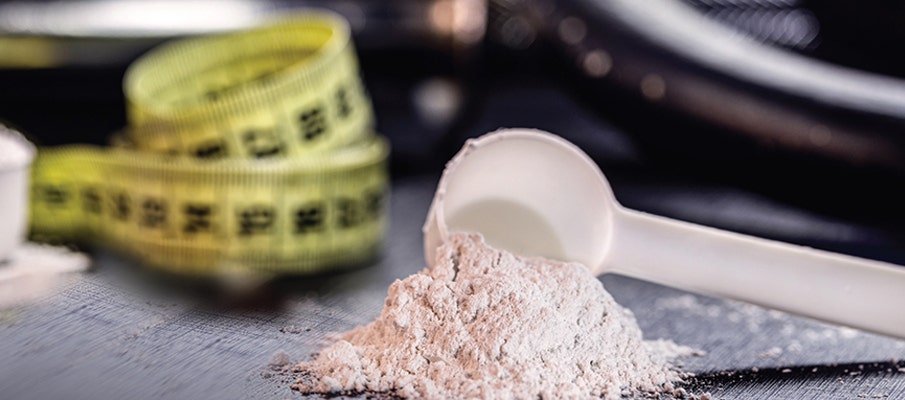What Is Creatine, and What Does It Do?
- 1/17/24


If you want to bolster your exercise performance, you may have considered taking creatine. As one of the most popular supplements for athletes, creatine has been studied for its role in athletic performance and muscle building for 200 years.
Let’s review what creatine is and how it may support your overall athletic performance.
What is Creatine?
Creatine is a compound found naturally in your body, primarily in the muscles. One of its main roles is to supply energy to the muscles during times of need, which is why many people take it to build strength and complement their workout regimen.
While creatine is naturally produced in your liver, pancreas, and kidneys, it is also found in animal foods such as red meat, seafood, and cow’s milk. Close to 95% of all creatine in your body is delivered to your muscles to pull from during physical activity, highlighting its important role in exercise.
How Creatine May Influence Athletic Performance
Creatine can facilitate energy production during exercise by helping your body replenish its ATP stores. ATP stands for adenosine triphosphate — a fancy name for the energy currency in your cells.
When you exercise, ATP stores (or energy) can rapidly decrease, depleting your energy levels. Maintaining your creatine levels can enhance workout performance and keep your muscles fueled for the challenging activities they need to endure.
Research suggests that creatine can be beneficial for various types of exercise, including high-intensity, strength, and endurance workouts.
High-Intensity
Several studies have shown a positive effect on performance when taking creatine for high-intensity exercises, which are workouts where ATP can deplete quickly. These may include fast-paced activities such as sprints or intense cycles.
Strength
A recent review of 16 randomized clinical trials found that taking creatine had a positive effect on strength and sports performance compared to the placebo groups.
Endurance
While creatine appears to be more directly beneficial for higher-intensity, shorter-duration exercises, it can still play a role in improving endurance. In particular, research shows that creatine supplementation can extend time-to-exhaustion endurance performance, especially during short bursts of activity.
Since many endurance athletes incorporate short intervals and sprints into their training plans, this can improve endurance over time.
How to Use Creatine for Athletic Performance
There are two main ways to incorporate creatine for athletic performance: diet and supplements.
Diet
As mentioned, creatine is found in high-protein animal products such as red meat, seafood, and milk in varying amounts. If your intake of these foods is variable, taking a creatine supplement may help further increase your muscle creatine stores.
Supplements
The most studied form of creatine is creatine monohydrate, which is found in most creatine supplements. The general recommendation is to get at least 3-5 grams of creatine daily.
Some trainers suggest what is called a “loading phase,” where you take a higher dose of 20 grams for five days and then decrease to a maintenance dose of 3-5 grams per day. However, newer research shows you can achieve the same benefits of taking creatine without this initial loading phase.
In addition to a high protein diet, incorporating creatine into your daily regimen may provide a modest boost to your athletic performance.
Our Sport Creatine + Probiotics supplement contains 5 grams of quality creatine monohydrate to support muscle performance, increase muscle mass, and bolster energy production at the cellular level.†
References:
-
Kreider RB, Stout JR. Creatine in Health and Disease. Nutrients. 2021 Jan 29;13(2):447. doi: 10.3390/nu13020447. PMID: 33572884; PMCID: PMC7910963.
-
Wax B, Kerksick CM, Jagim AR, Mayo JJ, Lyons BC, Kreider RB. Creatine for Exercise and Sports Performance, with Recovery Considerations for Healthy Populations. Nutrients. 2021;13(6):1915. Published 2021 Jun 2. doi:10.3390/nu13061915
-
Kreider RB, Jäger R, Purpura M. Bioavailability, Efficacy, Safety, and Regulatory Status of Creatine and Related Compounds: A Critical Review. Nutrients. 2022;14(5):1035. Published 2022 Feb 28. doi:10.3390/nu14051035
-
Wu SH, Chen KL, Hsu C, Chen HC, Chen JY, Yu SY, Shiu YJ. Creatine Supplementation for Muscle Growth: A Scoping Review of Randomized Clinical Trials from 2012 to 2021. Nutrients. 2022 Mar 16;14(6):1255. doi: 10.3390/nu14061255. PMID: 35334912; PMCID: PMC8949037.
-
Forbes SC, Candow DG, Neto JHF, Kennedy MD, Forbes JL, Machado M, Bustillo E, Gomez-Lopez J, Zapata A, Antonio J. Creatine supplementation and endurance performance: surges and sprints to win the race. J Int Soc Sports Nutr. 2023 Dec;20(1):2204071. doi: 10.1080/15502783.2023.2204071. PMID: 37096381; PMCID: PMC10132248.
-
Kreider RB, Kalman DS, Antonio J, et al. International Society of Sports Nutrition position stand: safety and efficacy of creatine supplementation in exercise, sport, and medicine. J Int Soc Sports Nutr. 2017;14:18. Published 2017 Jun 13. doi:10.1186/s12970-017-0173-z.
-
Erik Hummer, David N. Suprak, Harsh H. Buddhadev, Lorrie Brilla & Jun G. San Juan (2019) Creatine electrolyte supplement improves anaerobic power and strength: a randomized double-blind control study, Journal of the International Society of Sports Nutrition, 16:1, DOI: 10.1186/s12970-019-0291-x





